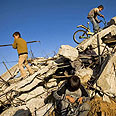
Gaza rubble - people prefer to buy food
צילום: AP
Gazans use reconstruction funds for daily living
With smuggling tunnels that serve as Strip's only lifeline being sealed off, costs of raw materials skyrocketing, average Gazans receiving compensation for damage caused to homes during Operation Cast Lead prefer to use money for daily living expenses such as food, clothes. Meanwhile, Gazan merchants benefit – until cash runs out
The liquidity problem in the Gaza Strip is improving, at least for the time being, and many of the donated funds have been flowing into the Strip in recent days, with thousands of Palestinians receiving compensation for the damage caused to their homes during Operation Cast Lead.
The funds were donated by various international bodies and the UNRWA, some of which were sent through Israel. But residents of the Strip understand these funds are just a temporary fix for the deep rooted deficit they are in, and many have told Ynet that they prefer to improvise on the reconstruction on their homes to use the remaining funds for their daily living expenses.
After the Israeli offensive, experts appointed by international organizations examined each house in Gaza and appraised the damage caused to each structure from the broken down walls to the shattered windows, and thousands of Gazans were allotted thousands of shekels in compensation.
"Someone who had a wall knocked down had it rebuilt at the absolute minimum cost," a Palestinian resident of Khan Younis told Ynet, "but anyone who received compensation for broken windows prefers to close the windows off with nylon instead of installing new ones, in order to use the money received for daily living."
The Palestinians said the money received from international organizations re-enters the market and improves the economic situation for various local merchants, and eventually, many sectors enjoy the sudden economic breath of life.
"Someone gets NIS 6,000 ($1,436) or NIS 7,000 ($1,675) for broken windows, and instead of going to fix the window, he goes and buys clothes that he has been planning to buy for two years now, or buys food that is considered a luxury, like meat, that many families haven't tasted in a long time," a Gaza clerk said, adding, "This leads to positive movement in the economy."
The clerk said another reason why people prefer to pass on their renovations and use the money for other needs is the high costs of raw materials such as cement or glass. Before the siege on the Strip began, a square meter of glass could be bough for NIS 30 ($7), and now it costs at least NIS 250 ($60).
Another sharp rise in prices has been recently felt in Gaza due to the continuously intensifying difficulties in the underground tunnel industry, as a result of Egypt's struggle against smuggling, that endangers what has been the Gazan economy's only lifeline in the past year.
Many Gazans whose homes have not been damaged have still managed to benefit from the situation. Another Palestinian told Ynet that in almost every neighborhood in the Strip someone can be found that took advantage of damage caused to their neighbor's home by presenting themselves as people who suffered damage as well.
"People have received money by claiming that they also suffered damage, and all this has increased the circle of compensated families, with each of them getting thousands of shekels on average. These are sums that haven't been seen in the Strip in a long time," the clerk said.
But the clerk stressed that these donation funds were only "artificial respiration", that created the illusion of economic revival. "The feeling is a little bit better," he said, "but in reality, it's just a sedative for a very difficult disease. The situation is still critical, and only the clerks that receive their wages are holding up the Palestinian economy, since they are they only ones that bring money in. The general feeling is one of compete despair, and that the war has only brought about an escalation in the situation."










